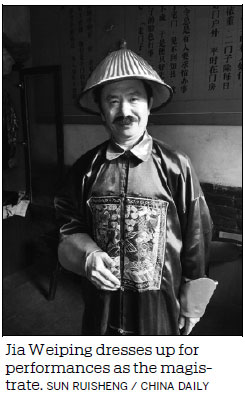Jia Weiping, 58, a performer of Jin Opera, has stayed home in Pingyao Old Town, Shanxi province, for most of his life. But he said he has been able to see the world through tourists thanks to Pingyao being named a UNESCO World Cultural Heritage in 1997.
Jia and 14 others, mostly in their 50s and 60s, were employed by the government to start a Jin Opera troupe, and for nearly 20 years the company has presented a popular story, County Magistrate Settles Lawsuit. Local scriptwriters created the play using Pingyao in the Qing Dynasty (1644-1911) as the backdrop. Jia stars as the county magistrate.
Every year, one in every three of Pingyao's nearly 13 million visitors from home and abroad see the play.
"The play is sarcastic and humorous, as they add catchwords on food safety and the anti-graft campaign of today to their performance, which portrays a lawsuit back in the Qing Dynasty," a tourist from Beijing surnamed Sun said.
When Jia and his colleagues first performed the play in early 1999, they didn't expect it would enjoy such a long run. Jia attributes its success to the development of the county.
He was a witness to Pingyao's changes. It's one of the best protected ancient towns in China, dating to about 2,700 years ago. Now it features a gray brick city wall, courtyards and the typical urban layout of a town in the Qing Dynasty.
In 1976, when he was a 16-year-old middle school student, Jia dropped out to attend a literature and arts training class organized by the county government. All graduates of the class were promised a stable government job. His was to be an entertainer in the traditional operatic art form.

Yet Jia lost this "iron-bowl" - or assured - job in 1991, when the county government dissolved the opera troupe in a sweeping round of institutional reforms to streamline the government's payroll. Jia then tried to make a living by selling clothes and driving harvesters.
"But I don't have a business mind, and lost money. I always wanted to resume my old job as a Jin Opera performer," Jia said. With the UNESCO designation for Pingyao, he got his chance.
Jia remembers that Pingyao was a lifeless, dilapidated town for most of the time before 1980 when the county started demolishing old buildings to "modernize its looks". That shocked urban planning expert Ruan Yisan, a professor of ancient town studies and protection at Shanghai-based Tongji University, who was doing field research with students in Pingyao.
Ruan went to Beijing to lobby the central authorities to stop Pingyao's demolitions. He also provided decision-makers in the construction and cultural relics protection departments with an urban planning project for Pingyao that he had prepared with his students, which aimed to preserve the town.
Ruan's proposal was adopted and played an important role in protecting the old buildings and city wall of Pingyao, which was key to its being recognized by UNESCO in 1997.
"Ruan is the savior of the town. That's why a main road in Pingyao is named after him," a rickshaw driver surnamed Zhang said.
The year also marked a turning point for Jia, as he was employed again by the government to lead the current Jin Opera troupe with his associates.
"The biggest change is not the renovated old houses but the awakening of local residents to the importance of protecting their old towns, traditions and values," Jia said.
Previously, the residents would remove bricks from the city wall to build their own houses. Nobody does that today: Every old brick and tile is cherished.
The rising awareness helped Jin Opera to rise as well.
"The opera has been enjoyed for hundreds of years. Maybe tourists would enjoy it too," Jia recalled.
The play proved to be a success. Audiences said it stimulated their imaginations about what happened in the old town in past times.
One of Jia's colleagues, surnamed Wang, said the troupe is not concerned about earning money. In fact, its members receive only a token payment of about 2,000 yuan ($290). Most of the revenue they generate goes to the protection and promotion of Pingyao. The town's annual tourism revenue has rocketed from 10 million yuan in the late 1990s to more than 15 billion yuan last year.